Perhaps one of the most rewarding parts of being a professor or clinical rotation supervisor is seeing students graduate and move forward in their careers. Along the way, there’s a good chance that some will ask you to write a recommendation letter to help boost their odds of getting into their chosen residency program.
If you’ve never written a recommendation letter for residency before, it’s worth understanding just how important a strong letter can be during the application process. In fact, Program Directors consistently list letters of recommendation that are specialty-specific as one of the top factors that determine whether a candidate will be invited for an interview.
When you believe in a student’s ability to succeed in their career, you want to do everything you can to help them take that next step. In this article, we’ll closely examine how to write a strong letter of recommendation for a residency program.
How to Write a Letter of Recommendation For Residency
When someone asks you to write a letter of recommendation for residency, and you believe they would be a strong candidate, it’s natural to be motivated to write the best recommendation letter possible. However, if someone asks you to write a letter and you feel you cannot write a supportive letter (for example, you didn’t have a positive experience with them or you didn’t work for them very long), it’s best to ask the applicant to ask someone else.
Use a Professional Letterhead
First, you want to ensure that admission officers see your letter as credible at first glance. In order to achieve this outcome, you’ll want to put your letter on paper with your professional letterhead.
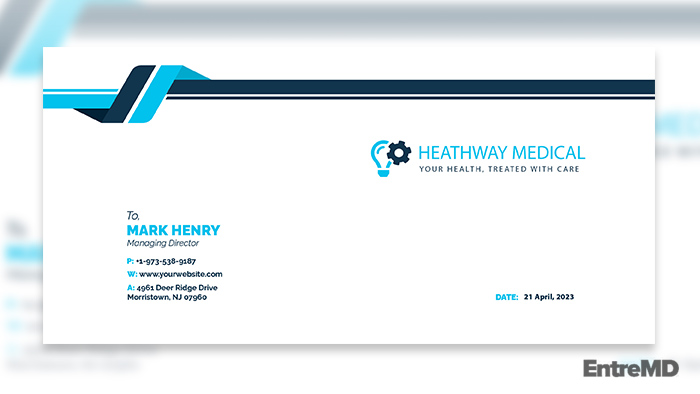
Beyond that, you’ll want to ensure the recipient’s name, title, and organization are displayed in the page’s top-left corner. This is also where you can place the date that you wrote the letter.
Use a Professional Salutation
Though business and professional communication has become increasingly casual in the last few decades, you’ll still typically begin your letter with the phrase “Dear [recipient]” when writing a residency recommendation letter.
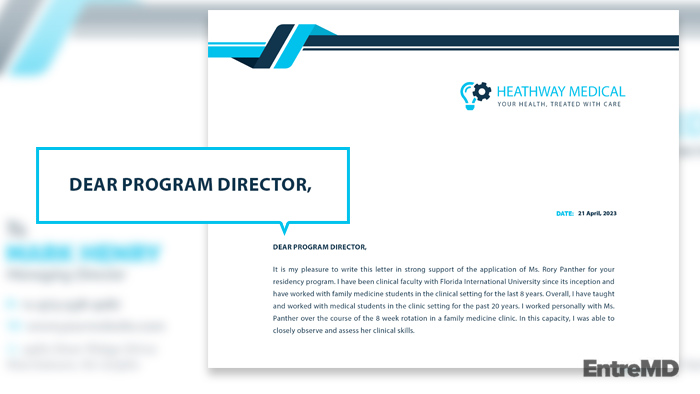
If you don’t know the name of the person who will be reading your letter, you can use a more general greeting such as “Dear Program Director.”
Organize Your Letter
The strongest recommendation letters have at least three paragraphs broken down into the introduction, body, and conclusion.
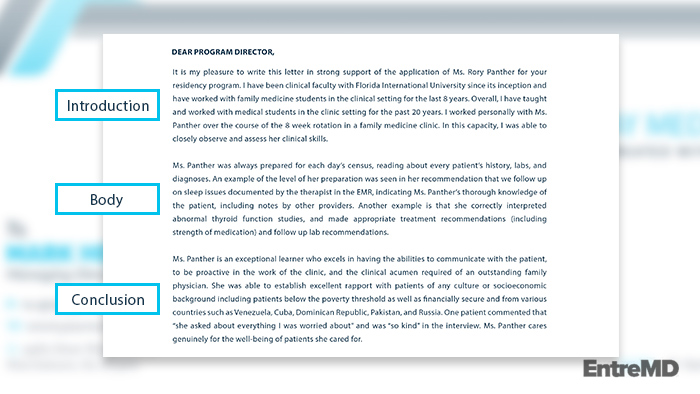
The introduction is your opportunity to express how you know the applicant and for how long. In the body, you can get into the specific details about the candidate’s abilities. Finally, your conclusion will be essentially a summary of your recommendation.
Start With a Statement of Intent
The most effective residency recommendation letters don’t beat around the bush– you’ll want to be straightforward and start immediately by stating the letter’s purpose.
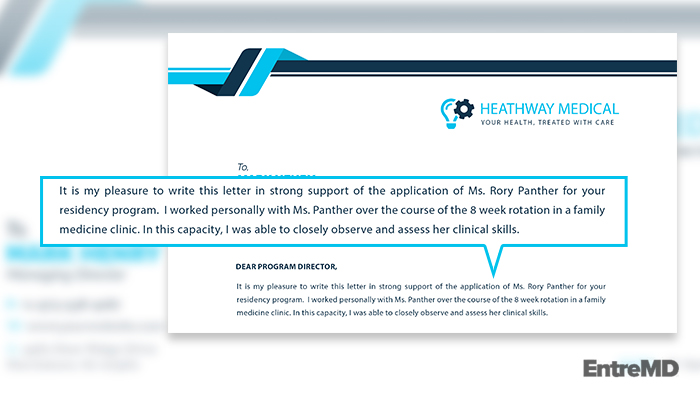
In the first sentence, make it clear that you’re writing the letter based on your experience with an applicant to the residency program.
Describe Your Relationship
Your recommendation will have more of an impact if you are able to provide a bit of context and describe the relationship you’ve had with the applicant. You can detail how long you were their mentor or professor and describe the nature of your interactions.

For example, you might list the clinical duties that you supervised or which courses you taught that the applicant attended. If you find that the prospective resident has exceptional medical knowledge, leadership skills, or other attributes that could help them stand out, you’ll also want to mention this. Take the opportunity to describe the ways in which the candidate excelled compared to other students you’ve worked with in the past.
Be Specific
Now that you’ve gone over some of the background of the relationship you had with the residency applicant, it’s time to get a little more specific. As you’re drafting your letter, try to brainstorm some times that you feel they really demonstrated skills that they would need to succeed in a residency program.

For instance, many admissions officers are searching for applicants with a strong work ethic, trustworthiness, and compassion.
Incorporate the Prospective Resident’s Specialty
If possible, it is best to base your letter around the chosen specialty of the candidate. This can provide additional information for the admission officers to determine whether the applicant would fit well into their program.

Discussing their specialty can also help expand upon the nature of the relationship between you and the student. Typically, candidates will try to ask someone who is familiar with their specialty to write their letter of recommendation.
Keep It Brief
In general, letters of recommendation for residency should only be one to two pages long.

Many find that three or four paragraphs are a sufficient amount of space to outline the achievements of a student applying for residency programs.
Draft a Strong Conclusion
As you tie up your letter, you’ll want to use the opportunity to sum up the strengths of the applicant and reiterate that you believe they would be a great addition to the program. If you’d like, you can also add that you’re available if the admissions officers have any more questions to ask about your experience with the applicant.
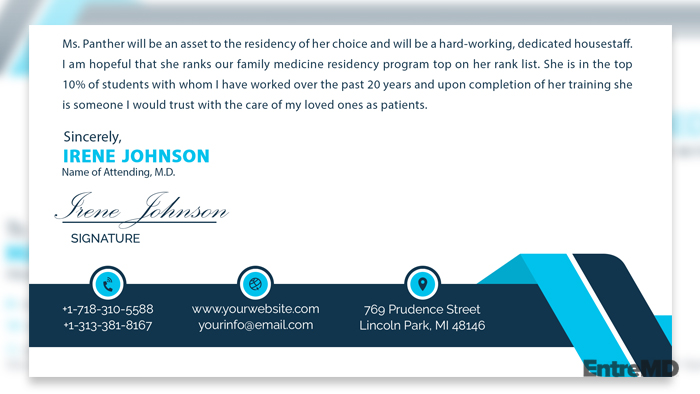
Once you have finished your conclusion, it’s time to sign off in a formal manner. Many will use the valediction “Sincerely” before signing their name. On separate lines, you’ll also want to state your name, job title, the name of your organization, your email address, and your phone number.
Are you a student who’s questioning whether or not you really want to go through with a residency program? If you’re curious to learn about what opportunities are available to you after medical school without completing residency, check out our guide to employment without residency.
Residency Letter of Recommendation Checklist
When you’re writing a recommendation letter for a residency applicant, it can feel like there are a lot of different components to keep in mind at once. Here’s a checklist you can use to make sure that all of the vital elements are included so your letter carries as much weight as possible.
Letter Format
There are a number of important elements to the proper formatting of a residency letter of recommendation.
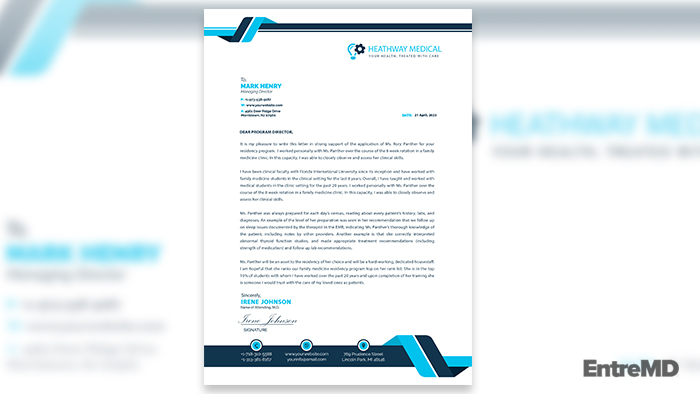
These include the length, letterhead, signature, and date.
Are you considering making a big change and no longer practicing medicine? If so, check out our five tips for doctors who are making big moves.
Length
It is generally recommended that residency recommendation letters are one to two pages long and at least three paragraphs. If you are struggling to write a letter that is long enough without adding a lot of fluff, you might want to reach out to the student for more information or recommend that they have someone else write the letter who has more experience working with them.

On the other hand, if the letter has gotten far too long, you’ll want to look it over and determine which pieces of information are the weakest and should be removed. Also, keep an eye out for repetitive information to help reduce the length of the letter.
Letterhead
Letters of recommendation should always have professional letterhead.
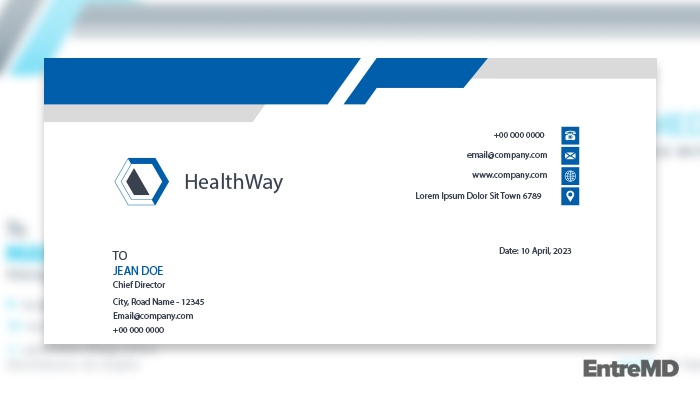
This letterhead should include the logo and name of the institution, the author’s name and title, and the date the letter was created.
Signature
A handwritten signature adds authenticity to a letter of recommendation.

Rather than just typing your name after the conclusion, go the extra mile and sign the letter with a pen.
Date
The date that the letter was written is also a crucial piece of information. Letters that were written within one year of an admissions office receiving them are ideal– these are strong letters of recommendation purely from a timeline standpoint.

If a letter of recommendation was written within the last two years but more than a year ago, it is starting to get a bit too old but can still potentially be used. Letters that are older than two years old are far from ideal. For this reason, you might want to let the applicant know that you are willing to update the letter periodically if necessary.
Origin of the Letter
In general, residency programs in the United States prefer letters of recommendation from the US rather than outside the country. That being said, many international medical graduates successfully use letters of recommendation that come from their own country of origin.

Beyond the geographic origin of the organization, there’s also consideration of the type of experience you have with the applicant. The ideal scenario would be experience in a hands-on clinical setting in the specialty the candidate chooses to focus on. In general, the letter of recommendation should come from someone who has experience with the applicant within a medical setting, whether that’s public health, research, or another venue.
Specialty-Specific
Generic letters aren’t nearly as effective as those that are written specifically to the specialty of the applicant.

Try to focus on the suitability for the specialty of the candidate and the strengths they have that could be appealing to the admissions office.
Nature of Relationship
You’ll want to make it clear just how long you have known the candidate as well as the nature of your relationship.

This is something you can state in a straightforward manner right from the get-go.
Content Quality
Finally, there are also important considerations about the quality of the content of the letter.
One essential component is that the letter includes specific examples of the characteristics and competency of the applicant. Rather than making generalized statements, try to tie broader concepts to particular examples that illustrate the strength of the candidate.
It’s also important that the letter of recommendation comes across as a source of genuine information about the applicant. The more it appears that the letter is a mildly adjusted template written by a professional who knows little about the particular candidate, the less effective it will be.

There’s nothing wrong with including some weaknesses in a letter of recommendation– it can help show that the information provided is objective rather than excessive or hyperbolic. However, any weakness that is mentioned should appear in the context of the applicant’s growth over time. You’ll want to make clear the ways in which they took steps to improve and were able to overcome the challenge.
Finally, it’s absolutely vital that there are no spelling or grammar issues in the letter of recommendation. Few things discredit a letter of recommendation more quickly than glaring typos and grammatical errors. You could choose to edit the letter on your own, or you might have it edited by a colleague to ensure that no issues need to be addressed.
Understanding the Importance of a Strong Residency Letter of Recommendation
There are a number of key functions that a letter of recommendation plays in a candidate’s residency application.

Here are some of the primary reasons why a strong letter is so important for an applicant’s success:
- Helping to demonstrate that the applicant has had experiences specific to the specialty they are pursuing
- Helping to showcase commitment to the specialty, strong work ethic, and contributions to the field
- Helping to demonstrate good rapport with a number of different physicians
- Helping to demonstrate academic performance, personal characteristics, and involvement
- Helping to reinforce other aspects of the student’s application, including their personal statement
Ready For More Control Over Your Work and Life?
Practicing medicine is incredibly rewarding, but it can also leave you feeling like you aren’t getting what you want from your work and life. Physicians around the country are increasingly interested in finding ways to continue using their knowledge to serve others without sacrificing all of their free time and the chance to have a personal life.

Are you starting to feel like you can’t live your best life while remaining employed in a traditional medical role? If so, you’ll be interested in learning more about the EntreMD Business School, an education experience that is specifically designed for physicians who want to create six and seven-figure businesses.
Are you ready to regain control of your life and work? If so, you can learn more here.


